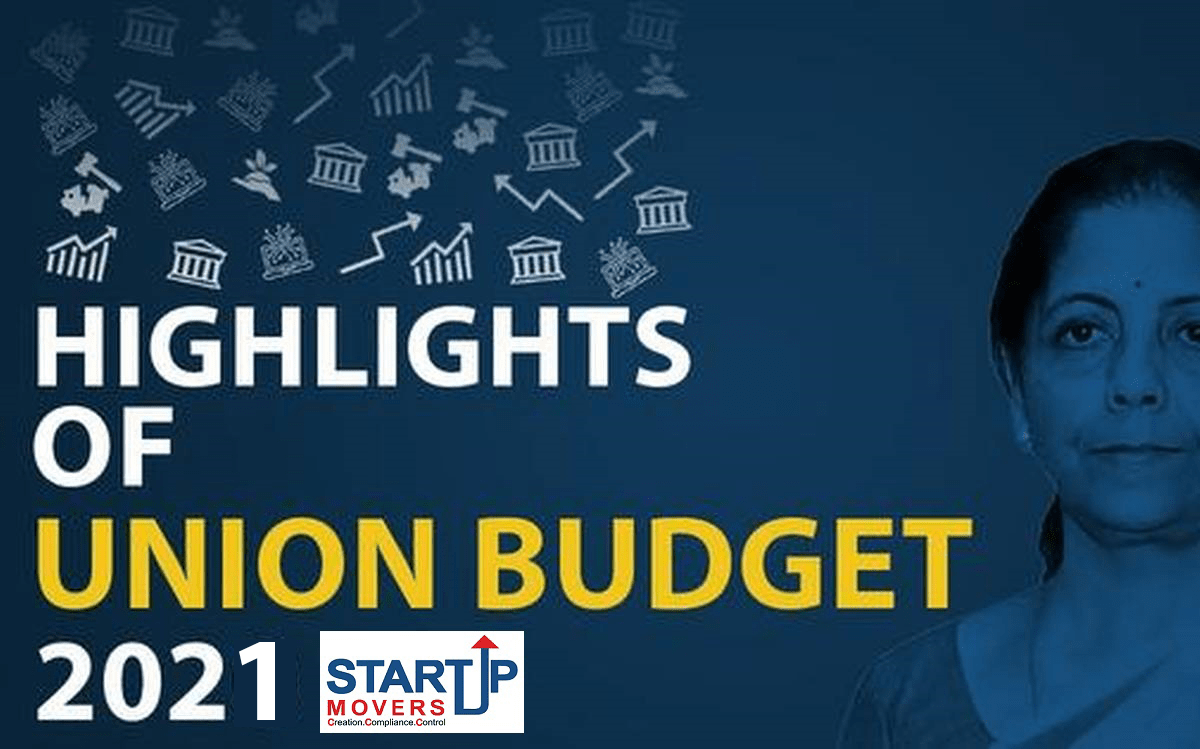
UNION BUDGET 2021-22
Startup Movers is happy to share key summary of Union Budget that are relevant for our clientele and Startup Ecosystem.
The Union Budget 2021-22, which has come at a time when India’s economy is reeling under the aftereffects of the Covid-19 induced lockdown, was presented by the Union Finance Minister Nirmala Sitharaman at Parliament on Monday.
The following are the key amendments in the direct tax, indirect tax and other domains
- Direct Tax Proposals
-
- Reduced compliance burden on senior citizens of 75 years and above. No need to file ITR if income is only derived from interest and pension
-
- The Finance Minister proposed to extend the eligibility period for claim of additional deduction for interest of Rs. 1.5 lakh paid for loan taken for purchase of an affordable house to 31st March, 2022.
-
- In order to increase the supply of affordable houses, FM also announced extension of eligibility period for claiming tax holiday for affordable housing projects by one more year to 31st March, 2022.
-
- Startups: Announced extension in the eligibility for claiming tax holiday for startups by one more year till 31st March, 2022. In order to incentivize funding of startups, she proposed extending the Capital Gains exemption for investment in startups by one more year till 31st March, 2022.
- Proposal to constitute Dispute Resolution Committee (Taxable income 50 lakhs and disputed income 10 lakhs)
-
- The Budget proposes that details of capital gains from listed securities, dividend income and interest from banks, post office etc. will also be pre-filled to ease filing of returns. Details of salary income, tax payment, TDS etc. already come pre-filled in returns.
-
- The Budget proposes to increase the limit on annual receipts for small charitable educational and medical trusts from present Rs.1 Crore to Rs. 5 Crore for non-applicability of various compliances.
-
- In order to allow funding of infrastructure by issue of zero coupon bonds, the Budget proposes to make notified infrastructure debt funds eligible to raise funds by issuing tax efficient zero coupon bonds.
-
- The Budget proposes to increase the limit for tax audit for persons who are undertaking 95 per cent of their transaction digitally from Rs. 5 Crore to Rs. 10 Crore to incentivize digital transaction
-
- Setting up of National Faceless Income tax Appellate Tribunal Centre.
-
- In order to reduce compliance burden, the Budget provides reduction in the time-limit for reopening of income tax proceeding for three years from the present six years. In serious tax evasion cases, where there is evidence of concealment of income of Rs. 50 lakh or more in a year, the assessment can be reopened upto 10 years but only after the approval of the Principal Chief Commissioner.
-
- To provide relief to such employees, section 10(5) has been proposed to be amended to provide an exemption in respect of cash allowance received in lieu of leave travel concession (LTC)
-
- It has been proposed that the exemption shall not be available for the interest income accrued during the previous year on the recognized and statutory provident fund in the account of the person to the extent it relates to the contribution made by the employees in excess of Rs. 2,50,000 in a previous year
-
- The deduction under Section 36(va) for contribution received by the employers from his employees towards any welfare fund shall be allowed only if such sum is credited by the employer to the employee’s account in the relevant fund on or before the due date prescribed under the relevant Act.
-
- LLPs are now not eligible for presumptive taxation scheme under Section 44ADA
-
- It has been proposed that exemption under Section 10(50) will apply for the e-commerce supply or services made or provided or facilitated on or after 01-04-2020 on which equalization levy is levied.
-
- The Finance Bill 2021 has proposed that the exemption under section 10(10D) shall not be available with respect to any ULIP issued on or after the 01-02-2021, if the amount of premium payable during the term of the policy exceeds Rs. 2,50,000 per annum. Further, it has also been proposed that a ULIP (not eligible for exemption under section 10(10D)] shall be treated as capital asset.
-
- The time limit for filing of belated return or revised return is proposed to be reduced by 3 months. Now the belated or revised return can be filed on or before December 31 of the assessment year
-
- The time-limit for processing of Income-tax return and sending of an intimation to the assessee has been proposed to be reduced from 1 year to 9 months from the end of the financial year in which the return is filed
-
- New Section 194Q is proposed to be inserted for deduction of TDS by a person (whose turnover exceeds Rs. 10 crores) who is paying any sum to any resident for purchase of any goods of the value exceeding Rs. 50 lakhs in any previous year. The tax shall be deducted at the rate of 0.1%, which shall be increased to 5% if the seller does not provide his PAN.
-
- A start-up is eligible for deduction under section 80-IAC if it satisfies certain conditions. One of the conditions provide that it should be incorporated between 01-04-2016 and 31-03-2021. The Finance Bill 2021 proposes to extend the outer date of incorporation to 31-03-2022
- Indirect Tax Proposals
-
- Deep analytics and artificial intelligence have been deployed to identity tax evaders and fake billers, launching special drives against GSTN System
-
- Review of 400 old exemptions in the custom duty structure this year to promote domestic manufacturing. She announced that extensive consultation will be conducted and from 1st October, 2021, a revised custom duty structure free of distortions will be put in place.
-
- Agriculture products: Custom duty increased on cotton, silk, alcohol etc. to help farmers
-
- Mobile phones parts and sub- parts: will move from “NIL” rate to a moderate 2.5 percent
- Reducing custom duty to 7.5% on semis, flat and long products of non-alloy and stainless steel. Exemption of duty on steel scrap for a period upto 31st March 2022.
-
- Announcing uniform deduction of the BCD rates on Caprolactam, nylon chips and nylon fiber and yarn to 5 per cent, the Minister said this will help the textile industry, MSMEs and exports too
-
- Raising duty on solar inverter from 5 per cent to 20 percent and on solar lanterns from 5 per cent to 15 per cent.
-
- Revision in duty rates on certain items immediately including tunnel boring machine and certain auto parts.
-
- Foreign exchange realization would be mandatory for refund of unutilized ITC for zero rated supply of goods. In case of non-realisation, benefit of refund would be deposited along with interest
-
- Section 35(5) has been omitted. Mandatory requirement of getting annual accounts audited and furnishing of Reconciliation Statement has been done away with. Further, furnishing of annual return with self-certified reconciliation statement has been facilitated
-
- The scope of supply has now been extended to the activities or transactions which involves supply of goods or services or both by any person such as clubs to its members or vice-versa for cash, deferred payments or other valuable consideration
-
- Retrospective amendment (with effect from July 01, 2017) under proviso to Section 50(1) of the CGST Act has proposed to provide that Interest under GST to be charged on ‘Net Cash Liability’ component retrospectively
-
- A new condition has been proposed to be inserted for availment of Input tax credit. Input tax credit on invoice or debit note can be availed only when the details of such invoices/debit notes has been furnished by the supplier in Form GSTR 1.
- Other amendments- Companies Act
- Companies with paid-up capital up to Rs. 2 crore and turnover up to Rs. 20 crore will fall under small companies.
Proposed to incentivize the incorporation of OPC by allowing OPCs to grow without any restrictions on paid-up capital and turnover. Allowing their conversion into any type of company any time. Reducing the residency limit for Indian citizens to 120 days from 180 days. This will be a big boost to startups




